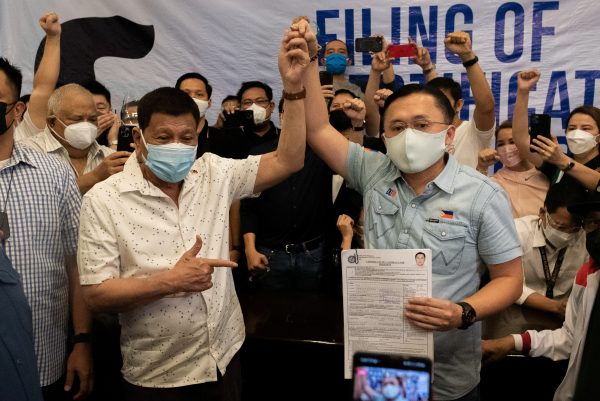In September 2021, COVID-19 cases peaked at over 20,000 daily infections. The deluge of patients stretched hospitals to breaking point. Hospital beds and oxygen ran out. Ambulances carrying emergency patients were turned away. Patients with mild-to-moderate symptoms were asked to go home and self-treat. As of mid-November 2021, there have been over 47,000 COVID-19 related deaths. The virus has infected more than 2.8 million Filipinos.
The spike in cases prompted another hard lockdown in Manila in August 2021. In the Philippines, the government under President Rodrigo Duterte implemented severe measures to curb the spread of the virus, including one of the world’s longest lockdowns. First imposed on 15 March 2020, modified lockdowns remain in place today.
Despite the lockdowns, the Philippines has failed to flatten its COVID-19 curve. Rapid virus transmission occurred because even though the government restricted mobility, many people had to continue to leave their homes to earn a living. Only US$100–$160 worth of aid has been distributed to each family since the start of the pandemic. Staying at home is not an option for the poor, particularly displaced informal workers and labourers of small businesses. A government survey conducted in April 2021 revealed that 62.1 per cent of Filipino households have experienced food shortages during the pandemic. Social protection measures have been severely inadequate.
The lockdown intervals were not used effectively to build more robust health infrastructure. The Department of Health leaned on local government units (LGUs) for the pandemic response, without sufficiently augmenting their resources and capacity. Given the disparity in the resourcing of LGUs and the spike in infections, the local public health system became overwhelmed.
The government’s pandemic response, the Bayanihan Act, allocated 8.6 per cent of GDP or around US$30 billion to finance health and economic programs. Yet this fiscal response in the Philippines is relatively meagre compared to the pandemic war chest of other middle-income ASEAN countries, such Malaysia, Indonesia and Thailand.
To make things worse, a huge chunk of the Philippine pandemic fund was lost to poor management and corruption. Based on reports of the Commission on Audit, around 9 billion pesos (US$170 million) was not used. The unused funds had to be returned to the National Treasury because the deadline for disbursement expired in June 2021. That amount could have been used to finance crucial upgrades of public hospitals and financially support health workers, many of whom resigned due to overwork, low compensation and unpaid hazard pay.
A Philippine Senate investigation also uncovered anomalous deals involving President Duterte’s close aids and top government officials, following a Commission on Audit report that flagged transactions involving 67 billion pesos (US$1.3 billion) worth of public funds. That amount could have made a big difference in boosting the resources of LGUs for their COVID-19 healthcare centres and social protection programs.
The Philippines scores poorly in international surveys conducted on COVID-19 government responses. Bloomberg’s COVID-19 Resilience Ranking placed the Philippines at the bottom of 53 major economies surveyed in September 2021 in terms of virus containment, vaccination coverage and opening up of the economy. Nikkei Asia’s COVID-19 Recovery Index ranks the Philippines last out of 121 countries surveyed regarding infection control, vaccination and mobility. The International Monetary Fund lowered its 2021 growth outlook for the Philippines to 3.2 per cent from a projected 5.4 per cent due to its uncertainty of recovery.
Despite the country’s dismal pandemic performance, nobody in the Duterte government has been made accountable for its failures. While President Duterte’s approval rating suffered a significant drop, as of 29 October 2021 it remains at 52 per cent, which is classified as ‘very good’ by polling and research institution the Social Weather Stations.
Before his term ends, President Duterte needs to seriously focus on correcting the weakness of his pandemic response. A calibrated, people-focused health and economic policy response is needed for a resilient recovery. If lockdowns are implemented, more generous and targeted social protection measures should be provided. If the economy is opened, it should be accompanied by soft mitigation measures and massive investments in public health in anticipation of a possible surge in infections. Support for LGUs, particularly in city centres, should be intensified to meet the needs of communities as they prepare for the opening of wider sections of the economy.
The government’s incompetent pandemic response has already resulted in thousands of lives lost and serious economic setbacks to what was once lauded the new tiger economy of Asia. Duterte’s popularity allowed him to get away with a botched pandemic response. As the Presidential election in 2022 looms, the biggest challenge for the opposition is how to make the people understand the connection between leadership failure and the economic and health devastation that the country is experiencing. The demand for accountable, competent and compassionate leadership must be unleashed.
Jenny D Balboa is a lecturer at the Tokyo University of Foreign Studies.

